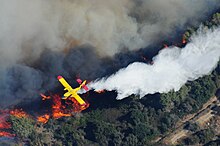Canadair CL-415
| Canadair CL-415 | |
|---|---|

|
|
| Type: | amphibious fire-fighting aircraft |
| Design country: | |
| Manufacturer: | |
| First flight: |
December 6, 1993 |
| Commissioning: |
1994 |
| Production time: |
1994 to 2015 |
| Number of pieces: |
76 |
Canadair CL-415 is an amphibious aircraft from the Canadian manufacturer Viking Air , which is mainly used as a fire fighting aircraft in forest fires . The machine is also used as a patrol aircraft. It is the successor to the Canadair CL-215 , from which it essentially differs through the modern propeller turbines instead of the piston radial engines .
The CL-415 M is available for civil passenger and freight transport tasks. This version has a higher allowable take-off weight.
development
The first flight of the CL-415 was on December 6, 1993. In addition to Canada (17), machines are also to France (12), Greece (7), Italy (19), Croatia (6), Malaysia (2), Morocco ( 5), Spain (4) and the USA (4).
The CL-415 is currently unrivaled as the only large, propeller-driven, modern amphibious aircraft. Russia has recently developed the modern Beriev Be-200 amphibious jet, and four Beriev Be-12 turboprop flying boats were converted in the 1990s into fire-fighting versions Be-12P comparable to the CL-415 .
Due to the economic problems, the former manufacturer Bombardier stopped production at the end of 2015 and sold the program to Viking Air in June 2016 .
Viking Air then developed the CL-415 EAF ("Enhanced Aerial Firefighter") version . These are modernized used CL-215 series V. In addition to PW100 propeller turbines, the avionics as well as flight controls and hydraulics have been modernized. In June 2019, the Indonesian government commissioned the conversion of a CL-215 into a copy of this new variant.
The government of Indonesia ordered six of the latest version CL-515 in June 2019. Two of these will be designed as fire-fighting aircraft, the other four as multi-purpose aircraft.
Technical specifications
| Parameter | Data |
|---|---|
| crew | 2 |
| Passengers | 30th |
| length | 19.82 m |
| span | 28.61 m |
| height | 8.98 m |
| Wing area | 100.33 m² |
| drive | two propeller turbines Pratt & Whitney Canada PW123AF with 2,380 WPS each |
| Empty mass | 11,789 kg (as a fire-fighting aircraft: 12,043 kg) |
| payload | 4,790 kg of cargo or 6,123 kg (= 6,123 l) of extinguishing water |
| Max. Takeoff mass | 17,100 kg (water) or 19,800 kg (from land) |
| Max. Flight mass | 21,000 kg (with max. Water absorption as a fire-fighting aircraft) |
| Top speed | 376 km / h at an altitude of 1,525 m |
| Cruising speed | 287 km / h |
| Initial rate of climb | 7 m / s at 20,870 kg |
| Takeoff route | 844 m (land) 814 m (water) |
| Landing route | 674 m (land) 664 m (water) |
| Max. Range | 2,427 km |
| Water drop | 54,140 l / h at a distance of 11 km between the source of the fire and the body of water for water absorption |
| Filling time of the tanks in the water | 12 s |
See also
Web links
- Sample approval sheet NAA-TCDS for CL-215 / -415 (PDF; 31 kB)
Individual evidence
- ↑ Be-12P on aeroflight.co.uk
- ↑ Low-cost airline Jetblue checks the C-Series , accessed on October 16, 2015
- ↑ Bombardier says goodbye to water bombers , accessed on June 23, 2016
- ↑ Viking nears CL-415 EAF start, CL-515 launch decision , Flight International, April 4, 2018, accessed April 4, 2018
- ↑ Flight International, June 25, 2019 (English), p. 25.

